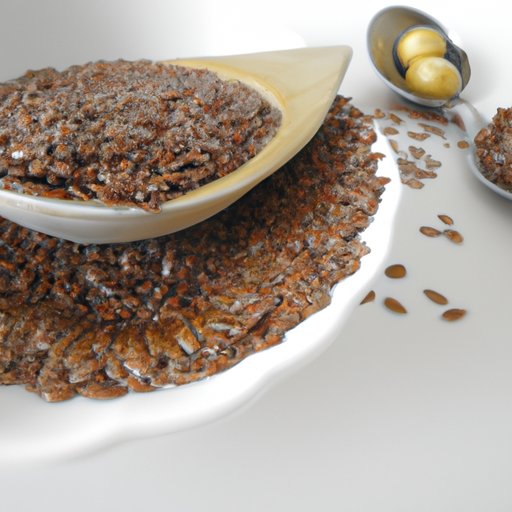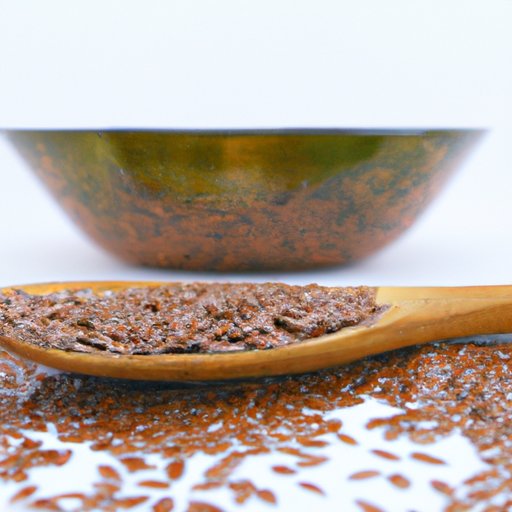Introduction
Flax seeds are one of the most popular superfoods on the market today, with many people turning to them as a way to improve their health. But what exactly makes flax seeds so beneficial? In this article, we’ll explore the various health benefits associated with this superfood, from its nutritional profile to its role in disease prevention and weight management.
Exploring the Nutritional Benefits of Flax Seeds
Flax seeds are packed with essential nutrients that can have a positive impact on your health. Let’s take a closer look at some of these nutrients and how they can benefit you:
High in Omega-3 Fatty Acids
One of the primary benefits of flax seeds is that they contain high amounts of omega-3 fatty acids, which are important for maintaining a healthy heart. Omega-3 fatty acids can help reduce inflammation, lower cholesterol levels, and improve circulation, all of which can help reduce the risk of heart disease.
Rich Source of Fiber
Flax seeds are also a great source of dietary fiber. Dietary fiber helps to promote regularity and can help reduce the risk of colon cancer. It can also help to keep you feeling fuller for longer, making it an ideal choice for those looking to lose weight.
High in Lignans
Flax seeds are also rich in lignans, which are plant compounds that have antioxidant properties. Lignans can help protect your cells from damage caused by free radicals, making them an important part of any healthy diet.
Rich in Protein
Finally, flax seeds are a great source of plant-based protein. Plant-based proteins can help to build muscle mass and can be a great option for those who are following a vegetarian or vegan diet.
Examining the Role of Flax Seeds in Disease Prevention
In addition to providing essential nutrients, flax seeds can also help to reduce the risk of certain diseases. Let’s take a closer look at how flax seeds can help prevent some of the most common chronic illnesses:
Heart Disease
Heart disease is one of the leading causes of death in the United States, but consuming flax seeds regularly may help to reduce the risk. The omega-3 fatty acids found in flax seeds can help to reduce inflammation and maintain healthy cholesterol levels, both of which can help keep your heart healthy.
Cancer
The lignans found in flax seeds have been shown to have anti-cancer properties. Studies have shown that consuming flax seeds regularly can help to reduce the risk of certain types of cancer, such as breast, ovarian, and prostate cancer.
Diabetes
Flax seeds can also help to reduce the risk of type 2 diabetes. The omega-3 fatty acids in flax seeds can help to improve insulin sensitivity and reduce inflammation, both of which can help to keep your blood sugar levels stable.

Discovering How Flax Seeds Can Improve Digestive Health
Flax seeds can also help to improve your digestive health. Here are some of the ways that consuming flax seeds can help promote better digestion:
Promotes Regularity
The high fiber content of flax seeds can help to promote regularity, making it easier for your body to eliminate waste. This can help reduce the risk of constipation and other digestive issues.
Reduces Symptoms of Constipation
The fiber in flax seeds can also help to reduce the symptoms of constipation, such as bloating and abdominal pain. Adding flax seeds to your diet can help to keep your digestive system running smoothly.

Investigating the Impact of Flax Seeds on Blood Sugar Levels
Flax seeds can also help to regulate your blood sugar levels. Here’s how:
Slow Release of Glucose
The high fiber content of flax seeds helps to slow down the release of glucose into the bloodstream, which can help to keep your blood sugar levels stable. This can be especially beneficial for those with diabetes or prediabetes.
Reduced Risk of Type 2 Diabetes
The omega-3 fatty acids in flax seeds can also reduce the risk of type 2 diabetes. Studies have shown that consuming flax seeds regularly can help to reduce the risk of developing this condition.
Exploring the Role of Flax Seeds in Weight Loss
Flax seeds can also be beneficial for those looking to lose weight. Here’s how:
Low-Calorie Option
Flax seeds are low in calories, making them an ideal choice for those looking to cut back on their calorie intake. Adding flax seeds to your meals can help you feel fuller for longer without adding extra calories to your diet.
High in Fiber to Help Curb Appetite
The high fiber content of flax seeds can also help to curb your appetite. Eating foods that are high in fiber can help you to feel fuller for longer, so you’re less likely to snack between meals.

Analyzing the Effects of Flax Seeds on Skin and Hair Health
In addition to providing essential nutrients, flax seeds can also help to improve the health of your skin and hair. Here’s how:
Boosts Collagen Production
The omega-3 fatty acids in flax seeds can help to boost collagen production, which can help to reduce the appearance of wrinkles and fine lines. This can help to give your skin a more youthful appearance.
Increases Hydration
The omega-3 fatty acids in flax seeds can also help to increase hydration in the skin, which can help to reduce dryness and flakiness. This can help to give your skin a healthier, more radiant glow.
Improves Hair Growth
The omega-3 fatty acids in flax seeds can also help to improve hair growth. Consuming flax seeds regularly can help to nourish your scalp and promote stronger, thicker hair.
Conclusion
Flax seeds are a versatile superfood that can provide a range of health benefits. From helping to reduce the risk of certain diseases to promoting digestive health and improving skin and hair health, flax seeds may be beneficial for overall wellness. For best results, try incorporating flax seeds into your diet in the form of ground flaxseed meal, flaxseed oil, or flaxseed capsules. With regular consumption, you may be able to enjoy the many health benefits that flax seeds have to offer.
(Note: Is this article not meeting your expectations? Do you have knowledge or insights to share? Unlock new opportunities and expand your reach by joining our authors team. Click Registration to join us and share your expertise with our readers.)
